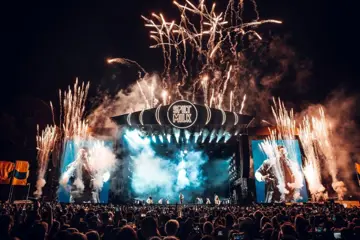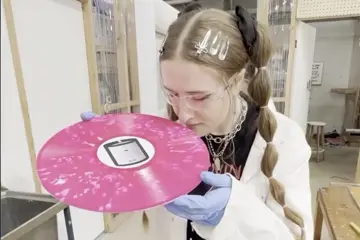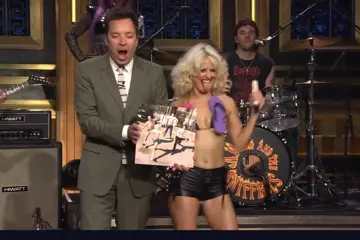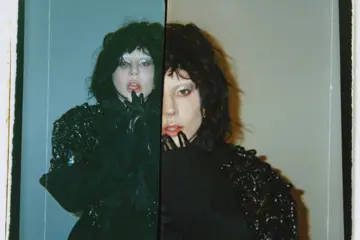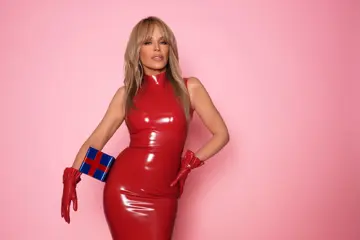It seems borderline absurd to suggest that the 25-year-old Catalan singer known as ROSALÍA, who’s already a bonafide superstar in her home country, would be an artist to watch in the coming year. But what Rosalía achieved in 2018 is truly unprecedented and her impact will continue to resonate throughout the years to come as the sound of music pushes further into the new globalist future she's created.
In November, the Spanish artist released her utterly transfixing sophomore album EL MAR QUERER, a concept record about a toxic relationship inspired by an anonymous manuscript from the 13th century. Working alongside producer EL GUINCHO, Rosalía made a radical artistic leap from the stark, acoustic guitar-led sounds of her debut album, Los Ángeles, dragging centuries of flamenco music and folk tradition along with her into the twenty-first century.
From the opening pitter-patter rhythms of slinky lead single ‘MALAMENTE (Cap.1: Augurio)’ it’s clear that you’re listening to something bracingly new. Musically, she combines flamenco’s intensely melodramatic style of singing and its complex system of rhythms driven by traditional palmas (hand clapping) and pitos (finger snapping) with contemporary production, 808 drum machines, James Blake-style harmonisers, synths and a sense of attitude that would make Rihanna blush. The result is a wholly original sound, a dizzying fusion of flamenco, pop, R&B and hip hop that also points towards the new, increasingly boundless and global sound of pop music.
One track on the album - ‘DE AQUÍ NO SALES (Cap.4: Disputa)’ - builds its beat out of a revving motorcycle engine, for example. Latest single ‘BAGDAD (Cap.7: Liturgia)’ begins by interpolating Justin Timberlake's ‘Cry Me A River’ and ends with a liturgical choral arrangement, while another track samples Arthur Russell. If you closed your eyes, the layered, auto-tuned vocals and pulsing synth arpeggios of penultimate track ‘MALDICION (Cap.10: Cordura)’ sound almost like what you could reasonably expect if James Blake made a flamenco track.
It’s a transformation which has earned her co-signs from the likes of Pharrell, Charli XCX, Dua Lipa, ARCA and James Blake himself, whose tweet: “The new Rosalía album, just what the actual afjhkhhhhhdiquyhqkzjdhjsnbahjkbbsbdhsjajbaFfdfffdffffffffffffffffffff” just about sums up the storm of hype that’s engulfed the singer in the back end of the year.
At the centre of it all is Rosalía’s breathtaking voice, which, whether reaching down into a melodramatic wail or soaring with an operatic vibrato or even borderline rapping, is hands down the most gorgeous singing I’ve heard in recent memory, an age-old, soul-scouring voice that you can hear entire familial lineages in, engaged in what Rosalía calls “the most pure form of communication” she knows.
She is an artist who is both totally of the moment and of the future, as well, representative of the new multipolar cultural flow. But even among the current crop of Latin stars pushing into the global mainstream (think: J Balvin, Bad Bunny, Ozuna, etc.), Rosalía is the first to achieve something truly great. And she's done it without compromising any of the inherent Spanish-ness of her music. Her work gets to a question that’s been shadowing music for the better part of the internet age: How do artists balance hyper-local, culturally specific histories with the borderless flow of a globalised world?
In taking apart the genre of flamenco and reinvigorating it for a millennial audience, Rosalía is, perhaps more than any other new artist from the past year, asking what what it means to be young in a country split between identities, that's being pulled in opposite directions. Not at all specific to her home nation, it’s a dilemma which feels essential to life in 2019.
For Rosalía, who can basically split her life into a "before" and "after" centred around the moment first heard the music at the age of 13 blasting from a car window, flamenco is “street music”. She promptly enrolled to study the genre at the Catalonia College of Music, which famously admits only one student per year to study the style, having to intimately learn the genre before she could un-make it. Nowadays, she tells Pitchfork, “young people right now don’t connect flamenco to something old, they see it as something cool. Nobody else has this music. It’s a style that only exists here, and it’s an important part of our culture, part of our very way of expressing ourselves”.
Every piece of Rosalía as a project - from the fashion to the choreography - is geared towards this, telling The New York Times that “the music is connected with my roots, with my culture, but it’s also connected with the rest of the world”. Like a lot of the standout music released in 2018, perhaps the best way to understand Rosalía is visually, through her gorgeously-shot music videos that muse on questions of gender, tradition and Spanish national identity, remixing contemporary Western influences with regionally specific symbolism.
However, it would be disingenuous of me to not bring up some of the charges of cultural appropriation levelled against Rosalía from some in Spain’s flamenco community here. The basic thrust of these charges goes like this: Flamenco was popularised by the working class Roma communities of Andalucía, but Rosalía, who is Catalan in background, is neither Andalusian nor Romany, leading to accusations of aesthetic appropriation and erasure. Still, others are dismayed at her iconoclasm, particularly in a genre which is so heavily rooted in the sanctity of tradition, alleging that her music isn’t “pure flamenco”. Rosalía, for her part, argues that flamenco - historically a blend of Moorish, Jewish, Spanish and Roma influences - doesn’t belong only to Romany culture.
However, maybe looking towards Rosalía as an ambassador for flamenco music is misguided, a temptation which non-Spanish audiences should be wary of. Across its 11 tracks, the confluence between tradition and the contemporary that plays out on EL MAR QUERER is the most aggressively radical, forward-thinking thing to hit pop music in the past year. She’s better viewed, in my (relatively uneducated) opinion as representing something new entirely.
That’s why Rosalía is an artist to watch in 2019 - because she epitomises so much of music's past, present and future. I think, at the very least, that you can expect to see her push even further into a global consciousness in the next year with a string of mainstream-crossover collabs, with her rumoured to be featuring on James Blake's forthcoming record. But like all great artists, she's a vessel for these broader cultural movements at play. It's less about what Rosalía herself does, and more about what those forces that she represents will do, how they will reverberate and shape the sound of music in the years to come; Rosalía is 2019.
Photo via NPR
Words by KYLE FENSOM
READ MORE ARTISTS TO WATCH HERE
SEE MORE
KOTA BANKS EMBRACES HER HERITAGE WITH 'FIORENTINA'
YAEJI'S DREAMY 'ONE MORE' GETS AN EQUALLY SURREAL MUSIC VIDEO
PREMIERE: ANGE’S CULTURAL IDENTITIES SHINE ON ‘CUANDO VA A ACABAR’



